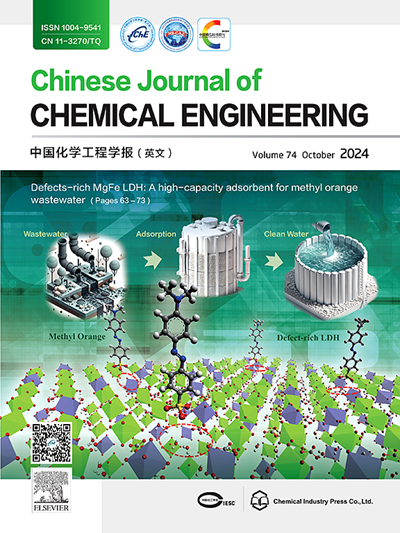Thermodynamics insights into the gas-phase synthesis of glycolide from methyl glycolate
IF 3.7
3区 工程技术
Q2 ENGINEERING, CHEMICAL
引用次数: 0
Abstract
Gas-phase synthesis of glycolide (GL) from methyl glycolate (MG) is of great significance for producing biodegradable polyglycolic acid. Here, we report a detailed thermodynamics study for the gas-phase synthesis of GL from MG, which involves complex reaction pathways, by utilizing the Gibbs free energy minimization method. The results indicate that the decompositions of MG and GL and the polymerization of MG are thermodynamically favorable as compared with the target pathway, i.e., the cyclization of MG. Effects of the reaction conditions including temperature, pressure and feed composition on the formation of GL and linear polymers have also been addressed, which demonstrate that the higher temperature and lower pressure can effectively inhibit the formation of linear methyl ester dimer and improve the selectivity to GL. In addition, the higher N2/MG ratio is beneficial for the formation of GL in the process promoted by catalysts. These thermodynamics results indicate that the process promoted by catalysts would benefit from the kinetics control by high-performance catalysts and the operation at high temperature, low pressure and high N2/MG ratio to enhance the yield of targeted GL. The insights demonstrated here from thermodynamics are valuable for guiding the design of catalysts and/or optimization of reaction conditions for the gas-phase synthesis of GL from MG.

乙醇酸甲酯气相合成乙醇酸酯的热力学研究
乙醇酸甲酯(MG)气相合成乙醇酸酯(GL)对生产可生物降解的聚乙醇酸具有重要意义。本文采用Gibbs自由能最小化方法,对MG气相合成GL的复杂反应过程进行了详细的热力学研究。结果表明,MG和GL的分解和MG的聚合在热力学上比目标途径MG的环化更有利。研究了反应温度、压力和进料组成等条件对GL和线状聚合物形成的影响,结果表明,较高的温度和较低的压力可以有效抑制线状甲酯二聚体的形成,提高对GL的选择性。此外,较高的N2/MG比有利于催化剂促进过程中GL的形成。热力学结果表明,高效催化剂的动力学控制以及在高温、低压和高N2/MG比条件下的操作有利于提高目标GL的产率,这些热力学结果对于指导MG气相合成GL的催化剂设计和反应条件优化具有重要的指导意义。
本文章由计算机程序翻译,如有差异,请以英文原文为准。
求助全文
约1分钟内获得全文
求助全文
来源期刊

Chinese Journal of Chemical Engineering
工程技术-工程:化工
CiteScore
6.60
自引率
5.30%
发文量
4309
审稿时长
31 days
期刊介绍:
The Chinese Journal of Chemical Engineering (Monthly, started in 1982) is the official journal of the Chemical Industry and Engineering Society of China and published by the Chemical Industry Press Co. Ltd. The aim of the journal is to develop the international exchange of scientific and technical information in the field of chemical engineering. It publishes original research papers that cover the major advancements and achievements in chemical engineering in China as well as some articles from overseas contributors.
The topics of journal include chemical engineering, chemical technology, biochemical engineering, energy and environmental engineering and other relevant fields. Papers are published on the basis of their relevance to theoretical research, practical application or potential uses in the industry as Research Papers, Communications, Reviews and Perspectives. Prominent domestic and overseas chemical experts and scholars have been invited to form an International Advisory Board and the Editorial Committee. It enjoys recognition among Chinese academia and industry as a reliable source of information of what is going on in chemical engineering research, both domestic and abroad.
 求助内容:
求助内容: 应助结果提醒方式:
应助结果提醒方式:


